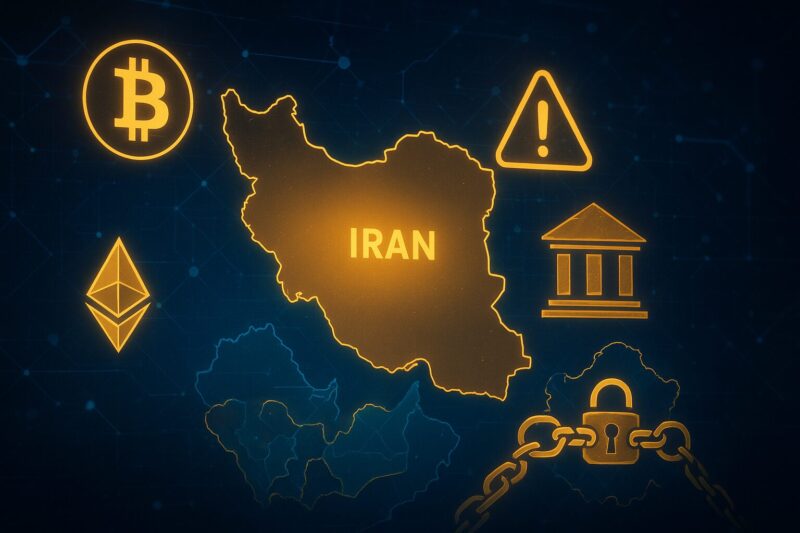Iran crypto sanctions are actually pushing Tehran to adopt cryptocurrencies for international trade settlements with BRICS partners, and officials declared at deBlock Summit, Iran’s first government-backed blockchain conference, that digital currencies are essential right now. This comes after France, the U.K., and also Germany restored Iran crypto sanctions in August 2025 through a snapback mechanism, which has accelerated the country’s plans for crypto adoption.
Also Read: BRICS Gold Strategy 2025–2030: Ongoing Purchases Signal Reserve Shift
Iran Leverages Crypto Trade Settlements With BRICS Amid Sanctions Risks


Government Positions Iran Crypto Sanctions Workaround as Necessary
Mohammad Bagher Ghalibaf, Speaker of the Iranian Parliament, outlined how Iran crypto sanctions are driving the BRICS cryptocurrency strategy at the summit, and he emphasized the urgency of the situation. Along with parliamentary commitments to blockchain initiatives, the government is focusing on attracting foreign capital into the digital currency sector.
Ghalibaf stated:
“Settling international transactions in digital currencies isn’t optional for us – it’s required.”
He also said:
“The Iranian Parliament hereby declares its readiness to work with academics, researchers, and businesses in this area. We want to attract as much investment as possible in digital currencies.”
The Iran blockchain adoption strategy was framed as critical for economic survival, and Parliament committed to collaborating with universities, technology firms, and even researchers on blockchain initiatives. At the time of writing, President Trump has threatened BRICS members with tariffs over alternative currency systems, though India rejected abandoning the dollar in August 2025.
Pooria Asteraky, chairman of the deBlock Summit, positioned digital assets as tools for de-dollarization and also stressed their technological importance.
Asteraky stated:
“Digital assets, while being a decentralized form of money, are also a technological tool that can help them achieve their goals of de-dollarization.”
Industry Leaders Challenge Iran Crypto Sanctions Regulatory Framework
Ehsan Mehdizadeh, CEO of Wallex Iran, criticized current regulations during a panel discussion and pointed to how Iran crypto sanctions actually justify the need for crypto trade settlements. The regulatory environment was described as inadequate by business leaders at the summit.
Mehdizadeh stated:
“A country facing sanctions cannot afford to reject innovative financial infrastructure. Yet Iranian regulators still haven’t grasped how blockchain technology functions.”
He also said:
“There is not a proper transparent regulatory environment for blockchain or cryptocurrencies to prosper.”
Mehdizadeh added:
“The SWIFT payment system has been cut off for us, so perhaps cryptocurrencies and blockchain can help. Digital and crypto currencies are one way to get around sanctions.”
Also Read: China Begins Production of Flying Cars, Will Export to BRICS Countries
Iran’s Central Bank maintains sole oversight authority and has imposed restrictions preventing Iranian Rial conversion to cryptocurrencies through local platforms, which creates obstacles for the BRICS cryptocurrency strategy. Shamseddin Hosseini, who heads Parliament’s Economic Committee, raised questions about subsidized electricity rates for mining operations versus residential users.
The tension between Iran crypto sanctions necessity and regulatory preparedness remains unresolved right now, and the Iran blockchain adoption push faces implementation challenges as business leaders warn that unclear frameworks threaten the crypto trade settlements infrastructure Tehran claims is critical for surviving Iran crypto sanctions and maintaining international commerce with BRICS partners.





